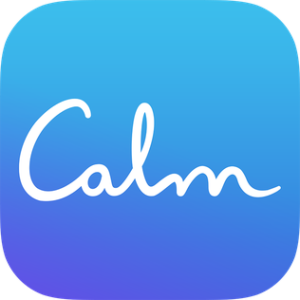
A great app will keep you glued to your device. Whether it’s lifestyle, social media, utility, gaming, productivity or news; apps are an essential part of student life.
Each month we challenge our Student Digital Champions to delve into a new category, delivering fresh perspectives and making proclamations for essential applications. Which features are dumb? What should be at the tip of your thumb?
Written by Bibiana Lebersorger, Emma Yi Kwan Lau, Hannah Harrison, Katie Stoker and Nia Burkinshaw




June: Wellbeing
Using a mobile device to improve wellbeing is counter-intuitive. In general, minimising screen-time is a good way to reduce anxiety, stress, and depression, as well as improve sleep. Yet there are specific ways in which we use our devices which are more problematic than others, such as compulsive checking (especially before bed), doom scrolling, obsessing over social media and prioritising use over developing real-life relationships.
It is important to be aware of the pitfalls and focus on developing and maintaining healthy habits. Prioritising your wellbeing is an investment that will not only benefit your academic performance, but also enrich your overall university experience and help you find the zen amidst the chaos.
Calm

As the number one app for sleep, meditation and relaxation, Calm focuses on slowing down and focusing on mindfulness techniques to help you lead a happier and healthier life. The app lets you tailor your Calm experience by allowing you to focus on certain goals, such as ‘Reduce Stress’ or ‘Develop Gratitude’, in order to personalise recommendations. On the home screen, you’ll find recommended videos and courses relating to your goals, with the option to favourite videos that work for you. The app really tailors its suggestions based on the user for example, as someone new to meditation, I was directed towards the ‘Mindfulness for Beginners’ course. Next to the home screen icon, you can find the ‘Discover’ feature, which allows you to find other categories such as ‘Music’ and ‘Soundscapes’. Another option here is to filter by goal or time, which is great if you have a specific element you want to improve or are short on time.
Pros
- 7-day free trial offered which allows you to test out whether the app suits you and your lifestyle
- Allows you to tailor your experience according to your happiness/health goals
- The ‘Profile’ feature allows you to track your stats, or as Calm calls it, your ‘Mindful Days’
- Named Apple’s App of the Year in 2017
- You can sync the app with Apple Health to better track your health
- The app background and home screen sounds are completely customisable in settings
- Available on both iPhone and iPad
Cons
- The cost is quite high, at £39.99/year or £3.30/month
- The videos won’t load without internet, so be sure to download anything you want to watch or listen to when you have Wi-Fi
I would really recommend this app to anyone who wants to focus on slowing down by implementing daily mindful habits. During exam season, I really wanted to focus on getting good quality sleep and avoid mindlessly scrolling right before bed, so I tested out the ‘Fall Asleep’ section. Here, you can find lots of different options to help you drift off, from peaceful soundscapes to sleep stories read by your favourite celebrities, and even podcasts by sleep experts who share their bedtime tips. I found the soundscapes great to put on before bed, and I think they did help me drift off quicker. Because Calm’s content is so varied, with new stuff being added each week, there are so many opportunities to discover what works for you.
Reviewer: Bibiana Lebersorger
Download links:
WorryTree

WorryTree is a simple mobile app that helps users to record and manage their worries in any location. It asks users to record things that they are concerned about, followed by a few short steps to guide them to reflect and create an action plan to resolve the problem. It is based on a Cognitive Behavioural Therapy technique (The worry tree technique) to enable us to track and challenge our worries.
There are two available plans for WorryTree users – Basic and Plus. Plus is the premium upgrade that is available via an annual or monthly subscription. Extra features in Plus plan are adding actions and events to your own calendar, an uncertainty-challenging tool, a gratitude journey, and having a negative thought-challenging tool.
Pros
- Help to develop a habit of self-reflection by recording and solving worries
- Have four guided sensory practices to help users to relieve their worries
- Seven days free pro subscription to access all functions before deciding to buy
- Free and Plus plans almost have identical functions so may not necessarily need to buy Plus plan
Cons
- Does not offer options and advice for you to solve the problem in both versions of the app
- Need to pay for full access to all functions e.g., Gratitude journal, Challenge a thought, Practice gratitude, Embrace uncertainty
- Only four focus practices are available to use in the application for both free and Plus plan
Recognising thoughts and recording worries can be difficult without guidance. WorryTree is a good starting point to begin keeping our own thoughts in a journal to support our wellbeing. An important aspect of wellbeing is the ability to manage stress. Some examples of skills that can help to improve our well-being include positivity, emotion regulation, and mindfulness. All these skills can be gradually developed or enhanced with the help of WorryTree app. I would definitely recommend the app to any student. There were times that I was unable to balance my work and social life. If I had used the app then, it would have improved my thinking to recover my wellbeing quicker.
In addition to the resources in the app, the service also offers advice on their website through blogs and podcasts (https://www.worry-tree.com/blog-categories; https://www.worry-tree.com/podcast). All of these offer extra support to users and even to non-users. All the blogs and podcasts are nice and precise. None are excessively long that I lose focus reading or listening to the whole piece. I personally found the information on their website very useful and is a great starting point to help me recognise little things I can do to solve my worries. Even if you are not planning to download the app yet, you may still want to have a read or listen to the resources available on their website for general tips and advice. They are simple, but I would say they are useful life tips!
Reviewer: Emma Yi Kwan Lau
Download links:
Sleep cycle
 Do you have trouble waking up in the morning? Find yourself endlessly hitting the snooze button? Sleep cycle is a smart alarm clock designed to help you wake up feeling energised and ready to tackle your day. It uses the sounds you make while you sleep combined with past data to analyse your sleep patterns and gently wake you up while you’re in your lightest sleep phase. Sleep cycle also provides detailed sleep analysis including ambient noise, time spent in bed and how long it took you to fall asleep, which can help you to understand your sleep cycles and find ways to ensure you always get a good night’s rest.
Do you have trouble waking up in the morning? Find yourself endlessly hitting the snooze button? Sleep cycle is a smart alarm clock designed to help you wake up feeling energised and ready to tackle your day. It uses the sounds you make while you sleep combined with past data to analyse your sleep patterns and gently wake you up while you’re in your lightest sleep phase. Sleep cycle also provides detailed sleep analysis including ambient noise, time spent in bed and how long it took you to fall asleep, which can help you to understand your sleep cycles and find ways to ensure you always get a good night’s rest.
Pros
- Free version available and 7 day trial for premium
- ‘Smart alarm’ wakes you up in light sleep
- Includes sleep aids such as relaxation exercises and stories to help you fall asleep
- Contains programs to help reduce the effects of factors such as screens and stress on sleep
- Option to analyse sleep without an alarm
- Set ‘wake-up window’ so that the alarm will always wake you up on time
- Sleep statistics track ambient noise, sleep quality, time in bed and how long it took you to fall asleep
- Feature to sync with smart watch in development
Cons
- Features such as sleep statistics, sleep aids, sound tracking and online backup require premium subscription which costs £29.99/ year
- Have to remember to manually set the alarm each night
- Not many options for alarm sound in the free version
- Have to sleep with phone very close so it can pick up sound
The sleep cycle app has a sleek layout, and is very easy to use. When you first open the app, you are prompted to create an account and then you are immediately taken to the alarm page, where you can set a deadline for the app to wake you up. The default ‘wake up window’ is 30 minutes, however you can customise this if you want to make sure you aren’t woken up too early! Once you’ve set an alarm, the app immediately starts recording sounds to track your sleep. This does mean that you have to manually set up the alarm each night to start the sleep tracking, and I found that your phone has to stay quite close to your face in order to pick up your breathing, which can be difficult if you don’t have a table or plug socket near your bed. However, it is interesting to track your sleep patterns, and there are programs in the app to help with identifying factors which may be impacting your sleep, such as screen time, ambient noise and even the weather! Overall, if you’re worried about your sleep, or struggling to wake up in the mornings, Sleep Cycle is definitely worth a try.
Reviewer: Hannah Harrison
Download links:
Finch

Looking for a self-care app to support yourself? Finch would be a great choice! The app will give you a self-care companion pet that will grow with you. The aim of the app is to make daily self-care feel rewarding and fun. Completing daily self-care exercises will help you grow your pet and help with your own wellness. You can also invite friends and family to join you on the journey. The app enables you to create a tree town to support your loved ones. The app developer also offers a wider community support Discord and Facebook group for users to connect with one another.
Pros
- Easy to set up the app and daily goals
- Can convert into a widget on the screen to watch your self-care pet
- Give users regular reminders throughout the day for reflection and check on their pet
- Provide users with positive quotes and statements when opening the app
- Help you to set daily goals when setting up the app
- Include stretches, exercises, relaxing soundscapes and a First Aid section to help us to get through intense exam stress
Cons
- Not all functions are unlocked in the free version
- Can be quite confusing when setting up the app as they will offer a 7-day free trail for Pro subscription that may not be what users are looking for
- Does not have a tutorial for new users to navigate different functions
I started using this app earlier this month, because I felt overwhelmed and stressed during the assessment period. Therefore, I started looking into apps that can help me to understand myself better and support my wellbeing. I tried various self-care apps which all offer great advice and guidance. However, those apps lacked a way to keep me motivated to use the app regularly and achieve those daily goals. I personally found the pet in Finch boosted my motivation to achieve daily goals and complete daily reflection, because I knew that there is a companion with me and will continue to grow with me. I really enjoy using Finch and would recommend it to any student!
Reviewer: Emma Yi Kwan Lau
Download links:
Headspace

It is super important to ensure that you are looking after yourself, both mentally and physically. While it can be difficult to take time in your day to relax and switch-off, there are plenty of apps available which can help you get into the routine. Headspace focuses on integrating meditation and mindfulness into your day, both of which help you focus, reduce stress and improve sleep. For a beginner or those not familiar with meditation, Headspace can be a super helpful guide.
Headspace also focuses on additional aspects of wellbeing too, making it a well-rounded app with all your wellbeing needs in one place. For example, the app offers workout routines such as yoga, dance breaks, mindful cardio, and quick workouts which can be easily slotted into a busy schedule (all exercise routines are guided by an instructor). You can also find a range of sleep-inducing podcasts such as those using narration, white noise, calming music or soundscapes. This is in addition to a selection of podcasts which discuss mental health, pushing through challenges, being creative and even making more time for yourself and the things you love.
Another great feature of Headspace is the music section. As a student, I understand how focusing can be difficult sometimes. However, music can be an excellent method of shutting out distractions and focusing on work. There are a selection of different playlists available which suit a range of needs and preferences.
You can set-up a personalised Headspace profile and select the areas you want to focus on e.g. managing stress and anxiety or improving sleep. You can then check-in to track your progress over time and review your activity history. You can also set-up several different preferences, such as linking Headspace to Apple Health to track ‘mindful minutes’, or making Headspace more accessible via audio-narrated description of the visual elements of Headspace videos.
Pros
- Easy to navigate
- Broad range of options
- 14 day free-trial can be used to give the app a try
- Can enable notifications to receive meditation, bedtime, or wakeup reminders. Great if you are forgetful or when you are only just starting to integrate Headspace into your daily routine
- Tracks app usage and progress
- Can make your own personalised profile
Cons
- Many of the features are locked in the free version. Annual (£49.99) or monthly subscriptions (£9.99) are available. However, there is a refer a friend scheme which offers a 30 day guest pass for one of your friends/family.
- While guided programs are available, Headspace has quite a busy interface which some might find overwhelming or confusing.
Overall, I would definitely recommend giving Headspace a go. The app offers a massive range of resources focusing on all areas of wellbeing. The free trial can be a great opportunity to test Headspace and see if it is right for you.
Reviewer: Katie Stoker
Download links:
Sleepful
 Sleepful is a free app primarily aimed at helping people overcome insomnia (difficulty getting to sleep or staying asleep.) In the app, you can track your sleeping patterns and hopefully see it improve. You input a number of details such as the time you went to bed, the time you fell asleep, and the time you spent awake in the night. With this data the app calculates your total sleep time and compares it to time in bed to calculate your overall sleep efficiency, presenting this information to you in a chart.
Sleepful is a free app primarily aimed at helping people overcome insomnia (difficulty getting to sleep or staying asleep.) In the app, you can track your sleeping patterns and hopefully see it improve. You input a number of details such as the time you went to bed, the time you fell asleep, and the time you spent awake in the night. With this data the app calculates your total sleep time and compares it to time in bed to calculate your overall sleep efficiency, presenting this information to you in a chart.
The other part of the app is related to CBT (cognitive behavioural therapy.) It offers a practical guide on improving your sleep with eight steps, each containing three activities to complete. These activities range from watching short informative videos to learn more about sleep and how to better control it, to practical steps which you can implement to increase your sleep efficacy (for example, on of the activities focused on five ways in which you can make your bedroom a better place to sleep.) These activities are fairly short, have no time limit, and can be completed at any time by the user. This means you can spend as much or as little time on them as you prefer.
Pros
- It’s free which is excellent considering it provides such detailed support
- All of the advice is based on science and studies and implemented CBT strategies
- The app also has an alarm feature
Cons
- It can be difficult to track your sleep accurately. It is difficult to know when you actually fall asleep without technology to help (such as a smartwatch)
- I found it really difficult to set up an account on the app, and had to visit their website
- The graphics feel a little basic
Overall, I feel the app would be very good for those who suffer with insomnia and are seeking a free way to take practical steps to improve their condition. The advice is presented in a very clear way and backed by scientific knowledge. Therefore, the app offers more than just sleep tracking, compensating for the relatively basic graphics. If you are solely interested in tracking your sleep, there are other apps with more visually appealing features that may be more enticing. One point worth noting is that I initially struggled signing up and creating an account on the app as none of the options seemed to work. However, I managed to resolve this issue by creating an account on their website, although the process felt a bit lengthy.
Reviewer: Nia Burkinshaw
Download links:
These apps aren’t supported or managed by the University of Bristol. Don’t forget to think about what data you are adding to these apps if you decide to download and use them. Our Online Identity video highlights some of the factors you may want to think about when you are online.



